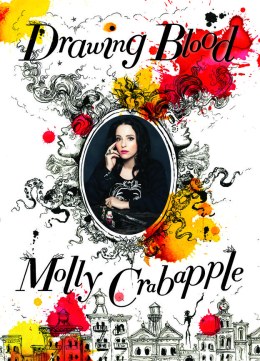Virtual Memories Show #150: Molly Crabapple
Podcast: Play in new window | Download
Subscribe: Spotify | TuneIn | RSS | More
“I always like smart, rebellious young people who feel like the world has done them bad.”
 Artist Molly Crabapple joins the show to talk about writing her new memoir, Drawing Blood
Artist Molly Crabapple joins the show to talk about writing her new memoir, Drawing Blood (Harper), making illustrated journalism from Syria, Guantanamo and Abu Dhabi, translating Nizar Qabbani, growing into her parents’ legacy of art, Marxism and argumentation, finding her soul in the Damascus Room at the Met, balancing community and competition, stepping back from the idea that we’re in an “Age of Outrage” and more! Give it a listen!
“The world hates refugees. I’m convinced that if there was a major crisis in Canada and we had 10 million white refugees, we’d still think of some reason to keep them out. People hate impoverished people fleeing over borders.”
 We also talk about Charlie Hebdo, the Occupy movement, Molly’s success at bypassing the gallery model and whether her path is replicable, the scariest place she’s ever visited as a journalist, her biggest artistic, literary and journalistic influences, and more! (And if you want to find out who she’s reading nowadays, join our Patreon and become a monthly contributor to The Virtual Memories Show!)
We also talk about Charlie Hebdo, the Occupy movement, Molly’s success at bypassing the gallery model and whether her path is replicable, the scariest place she’s ever visited as a journalist, her biggest artistic, literary and journalistic influences, and more! (And if you want to find out who she’s reading nowadays, join our Patreon and become a monthly contributor to The Virtual Memories Show!)
Podcast: Play in new window | Download
Subscribe: Spotify | TuneIn | RSS | More
Enjoy the conversation! Then check out the archives for more great episodes! You might like:
Follow The Virtual Memories Show on iTunes, Twitter, Facebook, Tumblr, and RSS!
About our Guest
Molly Crabapple is an artist and writer in New York. She is a contributing editor for VICE, and has written for The New York Times, Paris Review, and the Guardian, among other publications. Her work is in the permanent collection of the Museum of Modern Art. Follow her on Twitter and Tumblr.
Credits: This episode’s music is Nothing’s Gonna Bring Me Down by David Baerwald, used with permission of the artist. The conversation was recorded at Ms. Crabapple’s studio on a pair of Blue enCORE 200 microphones feeding into a Zoom H5
digital recorder. I recorded the intro and outro on a Blue Yeti USB Microphone
. Processing was done in Audacity and Logic Pro. Photos of Ms. Crabapple by me.









 We also talk about Charlie Hebdo, the historical arc of gay marriage covers, the contrasts of her multimodal education in France with the American model, which comics she started her kids off with, how she deals with the moving target of diversity, the evolution of women in the comics scene, and why kids are a fantastic audience.
We also talk about Charlie Hebdo, the historical arc of gay marriage covers, the contrasts of her multimodal education in France with the American model, which comics she started her kids off with, how she deals with the moving target of diversity, the evolution of women in the comics scene, and why kids are a fantastic audience. 







